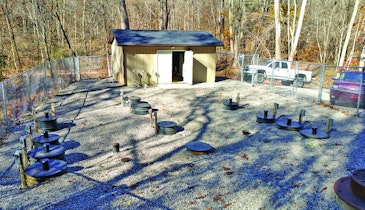Interested in Education/Training?
Get Education/Training articles, news and videos right in your inbox! Sign up now.
Education/Training + Get AlertsSeptic system care seems so simple: Much depends on what you flush or don't flush. In my capacity as editor of Treatment Plant Operator magazine (for operators of municipal treatment plants) I've learned about a problem for septic and sewer systems alike: All those disposable wipes we use these days.
It started with baby wipes. Then hand towelettes. Then makeup remover wipes. Disinfecting wipes for the kitchen. Furniture wipes. Protectant wipes for vehicle tires. On it goes. A search on the Wal-Mart website brings up nearly 600 wipe products.
Where do all these wipes go? Some of them – not an insignificant number it appears – get flushed down toilets, where they contribute to home plumbing blockages, septic system trouble, municipal sewer overflows, and increased loading on headworks in wastewater treatment plants.
Is it a problem?
First off, I'd like to know from onsite practitioners: Are these wipes an issue? Do they cause a meaningful number of home plumbing and septic
system trouble?
Folks on the municipal side say that some of these wipes are labeled as "flushable," when in fact they are not in the true sense – meaning they do not disintegrate in water the way toilet tissue does. And, as such, they can be problematic if flushed.
I can't say from experience whether flushing wipes causes problems – although as the owner of a septic system for a year, I'm quite serious about taking care of it. I do know that products other than wipes, when flushed down a toilet, can do harm.
So my wife and I have a rule that I'm sure is familiar to onsite professionals: We put nothing in the toilet except toilet paper. It's a simple rule we easily follow. But then I thought, "What about our grown-up kids and other visitors from the city? What are their habits? Will they just automatically abide by our rule?" I concluded: Probably not.
Just a sign
So we framed a little 3- by 5-inch sign (the size of an index card) and hung it just above the paper holders in both bathrooms. It says:
SOS
(Save Our Septic)
Please flush nothing except toilet tissue.
It's friendly and unobtrusive, yet its message is simple and clear. And people who see it are likely not just to observe it when they visit us but also to remember it when they visit other people in country homes.
In my humble opinion, this is far more effective than trying to get this message to people through the news media or brochures or websites. And it's certainly easier than trying to teach people which wipes and other products are flushable and which are not.
Giveway item?
And so, there's an idea. What if as an installer (or service contractor) you gave away little signs like these to customers? Create a clever design and include an inexpensive wooden frame.
With this simple device you could help customers avoid potentially costly nuisances, and help prevent emergency calls for you and your team.
The best rules are usually the simplest, and the best forms of education are usually clear and direct. These little signs pass both tests. And they have plenty of utility on the municipal side, too – except there the SOS stands for "Save Our Sewers."
You probably know better than I do whether this idea has merit – you're the professionals and I just edit a magazine. So I offer you this for the good of the order. Ignore it if you wish – or use it in good health!





